Rapeseed /Brassica napus/ is a plant with bright yellow flowers, which are widely grown throughout the world. Rapeseed comes from the Mediterranean, considered a variety of wild rapeseed. Grown in the cool and temperate, it is not a fussy plant and grows well at low temperatures.
Rapeseed is a very sought after product in the European markets, which defines it as an integral part of modern grain. It blooms from April 15 to May 10, therefore, is a massive source of pollen for bees.
History of rapeseed
Rapeseed has been known since 4000 BC. As seen, its home is the Mediterranean, where it later began to spread to Asia. In the 13th century, rapeseed found its way to Western Europe, where it became a major oilseed crop.
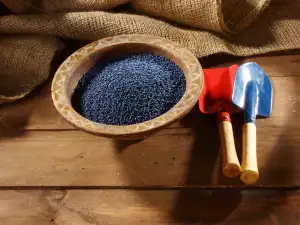
By the beginning of World War I, rapeseed was a major oil source. During the war arises an extreme shortage of oil, accelerating the deployment of sunflowers, which just a few years shifted rapeseed.
By 1965 rapeseed was sown annually and then their production completely stopped. Since the beginning of 1980 a systematic study of plants from family Brassicaceae, to which rapeseed belongs started. Five years later, more than 360 varieties of rapeseed were studied worldwide. In 1986 it is proposed to implement the country's first wintering variety - oilseed rapeseed "Marinus" and two years later the first register and a type of winter rapeseed oil - "amber".
Composition of rapeseed
Rapeseed contains 40 to 52% slow drying oil, 20% protein and 17% carbohydrate. The composition of old rapeseed varieties had 45% erucic acid and glucosinolates, which are not only harmful to the body, but reduce the quality of the rapeseed. Nowadays, there are new varieties of rapeseed that create opportunities for growing it in more and more countries around the world.
The nutritional quality of rapeseed oil is determined by the oil-acid composition and contained vitamins A, E, K and D, phosphatides and tocopherols. About 85% of the composition of rapeseed oil are essential fatty acids - linoleic 20% and 65% oleic acid. In the processing of rapeseeds a very valuable protein meal is made.
Selection and storage of rapeseed
When purchasing rapeseed note the label on which the manufacturer and expiration date shall be indicated. Like other types of oil, rapeseed oil is stored in a well-stoppered bottle in a dark and cool place. Rapeseed oil reserves its transparency for a long time and is not affected by odors in the air, like soya bean oil.
Use of rapeseed
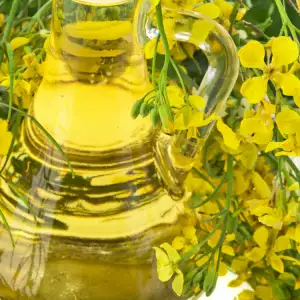
By the 60s of last century rapeseed oil is mostly used for technical purposes in most countries - leather and textile industries, and the production of soap. Rapeseed is used as fodder for animals, and recently appeared as one of the main raw materials for obtaining biofuel for diesel engines. Furthermore, rapeseed is one of the best honey plants, one acre of rapeseed can receive up to 10 kg of honey.
Rapeseed is widely used in cooking, in the form of oil. Rapeseed oil is used mainly for making marinades, cold dishes, mayonnaise and other sauces. If you warm it up to 180 degrees, you can fry it with vegetables and meat. Heating is not recommended to higher degrees.
French chefs make a salad, which has a very original flavor, although they use many common vegetables - fresh tomatoes and cucumbers, peppers and mushrooms. Finally, they sprinkle the salad with a little lemon juice and rapeseed oil and enjoy the taste.
Benefits of rapeseed
The value of rapeseed oil, like olive oil is that it is very rich in polyunsaturated fatty acids. These substances help to reduce blood cholesterol and strengthen blood vessels. They prevent the risk of thrombus formation and the emergence of a number of serious diseases, including cancer.
Rapeseed contains linoleic acid, and as a deficiency in the organism leads to narrowing of blood vessels and poor circulation, which can cause up to stroke or myocardial infarction.
Dangers of rapeseed
Many scientists and nutritionists argue on the benefits and harms of rapeseed. While some believe that it reduces the levels of cholesterol in the blood, others believe that rapeseed oil has a very negative effect on health. Recent studies are about to end this debate.
It appears that prolonged use of rapeseed oil forms fatty deposits on the kidneys, adrenal glands, heart muscle and thyroid. After discontinuation of rapeseed, the organs still have scars. It turns out that rapeseed oil can not be purged from the body.
Despite these facts, however, rapeseed oil is widely applied in the production of popcorn, mayonnaise, bread, butter, margarine, crisps, biscuits, baby food and more.
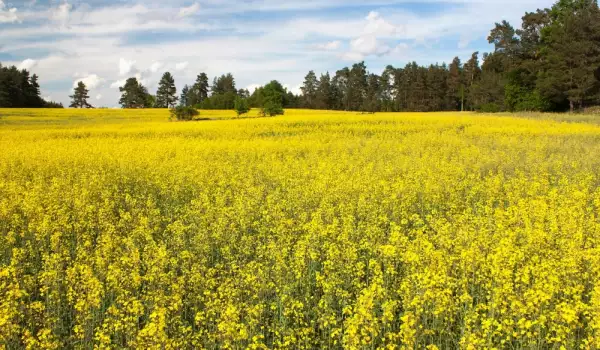
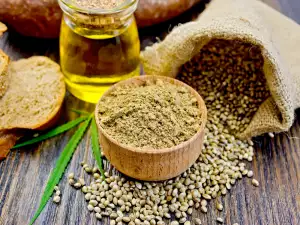

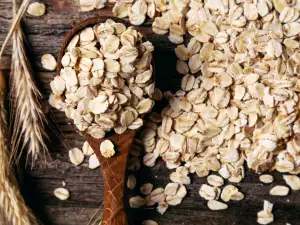
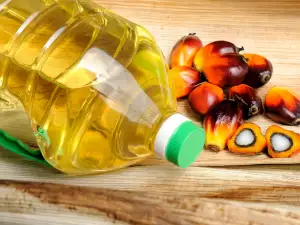

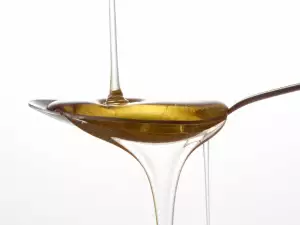
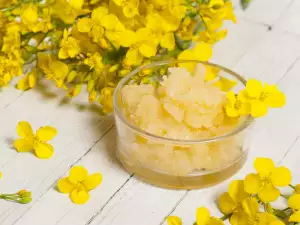

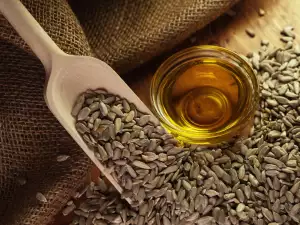





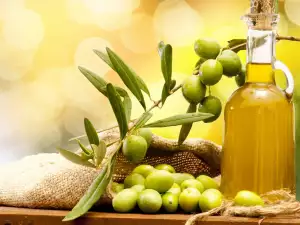
Comments